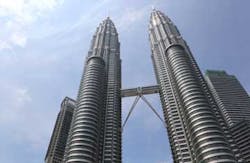Malaysia surpasses Indonesia as top producer of hydrocarbon in Southeast Asia
Malaysia managed to surpass Indonesia as the top producer of upstream hydrocarbon products in Southeast Asia in 2012, amid the difficulties that Indonesia experienced in attracting new investors and shrinking oil production, a new analysis from the Wood Mackenzie Group has revealed.
Indonesia, which used to be the sole Southeast Asia member of the Organization of the Petroleum Exporting Countries (OPEC), only managed to account for 14 percent of the total amount of the newly discovered oil and gas reserves in the region. Overall, 2012 brought disappointment to Indonesia as far as energy goes, Wood Mackenzie commented, as quoted by the Jakarta Post. Indonesia has been implementing unfavorable policies toward oil and gas companies and this has contributed to the decline in oil production from 1.3 million barrels per day ten years ago to the current figure of around 830,000 barrels per day, as the state relies on fields that are gradually running low in oil reserves.
Other exploration projects that the report deemed as "disappointing" were two oil and gas fields in the Makassar Strait, Sulawesi, operated by the Norwegian company Statoil, and a number of wells drilled by Dutch firm Pexco in North Sumatra and Italy's ENI off the coast of East Kalimantan.
RELATED: Honeywell's UOP, Malaysia's PETRONAS to collaborate on natural gas processing technology
According to the Edinburgh-based global energy research firm, last year Indonesia discovered new deposits estimated to hold 13 million barrels of oil equivalent (boe) in 20 new oil and gas fields. However, this figure is dwarfed by the 1.4 billion boe discovered in Malaysia in 2012, or 72 percent of the total discovered reserves in the region. Six of the newly discovered fields hold a total of 7.3 trillion cubic feet (tcf) and were ranked among the biggest 10 discoveries in Southeast Asia.
Some of the most successful companies in Malaysia include state-owned Petronas Carigali, Swedish Lundin Petroleum and U.S.-based Murphy Oil, which was hit by a $214.6 million loss following a four-year exploration period offshore Papua, Indonesia, in which it discovered dry holes only. However, it made up for these costs thanks to operating three fields off the coast of Sabah, Malaysia, holding an estimated 600 bcf of gas.
One of the reasons behind Malaysia's success lies in the fact that the state introduced a number of financial incentives to promote exploration and development. Last year the Malaysian government awarded a total of 13 production sharing contracts, which is a record number in a single year, Wood Mackenzie noted.
Meanwhile, Indonesia only awarded 20 contracts in 2012, compared to 52 in 2011. Myanmar's three licences awarded, compared to 12 in the previous year, also contributed to the overall gloomy licensing activity in the region over the past year. In total, there were 47 contracts awarded in Southeast Asia, which marked a 36 percent decline from the previous year, figures show.
Wood Mackenzie concluded that in 2012 the overall exploration activity in Southeast Asia dropped to 190 wells completed, in comparison to the average of 200 wells completed in previous years. The biggest exploration decrease was recorded in Thailand and Vietnam.
